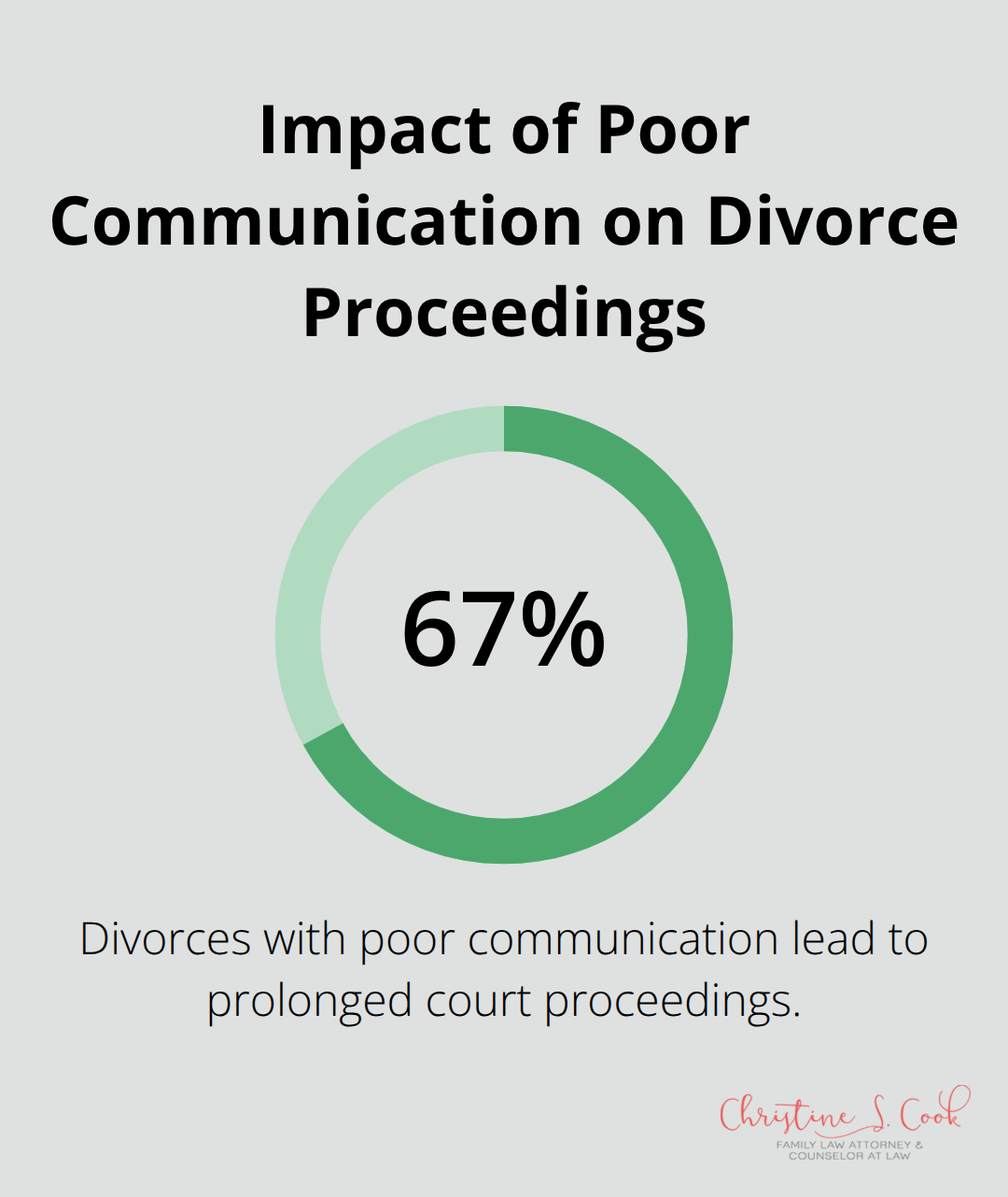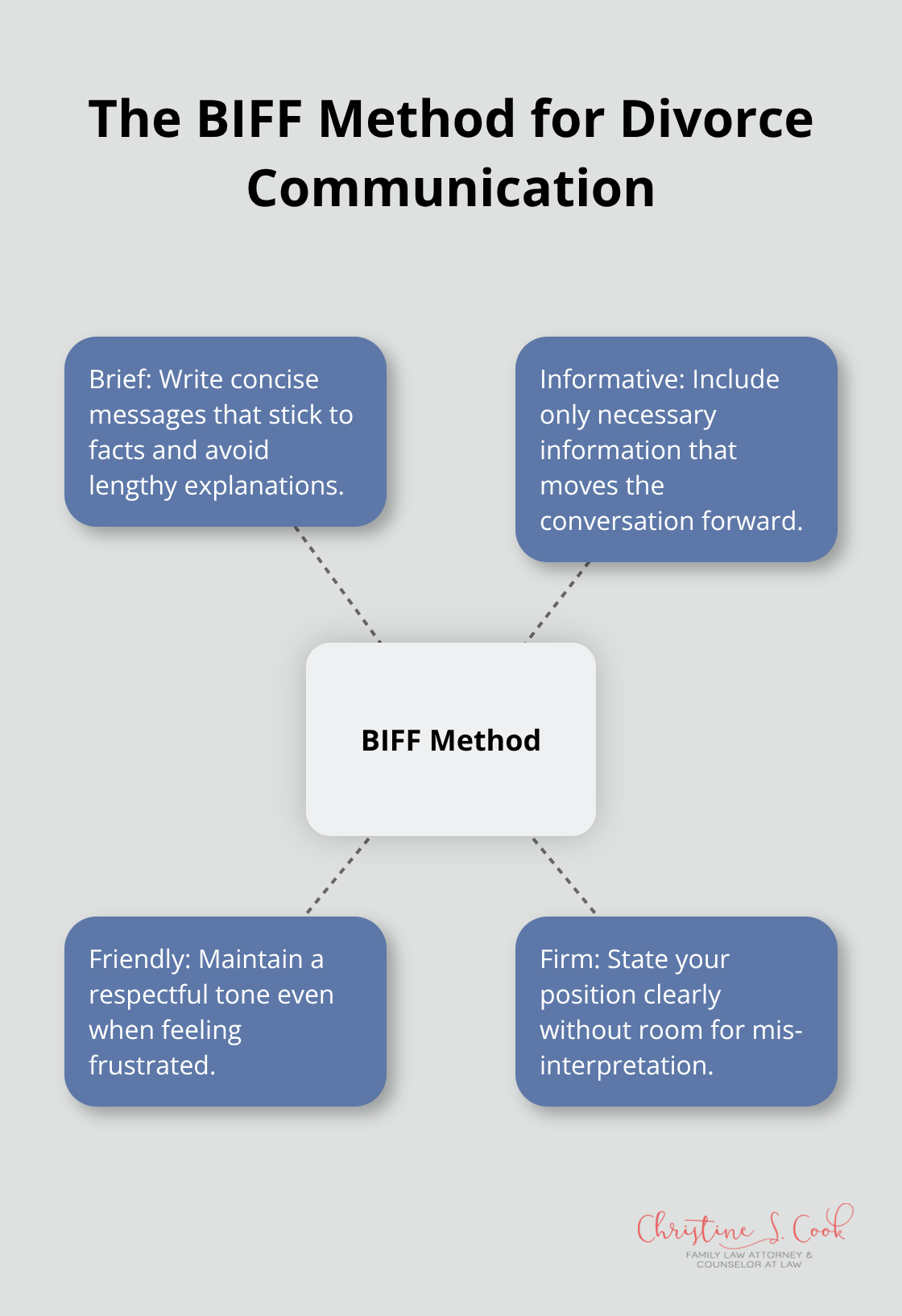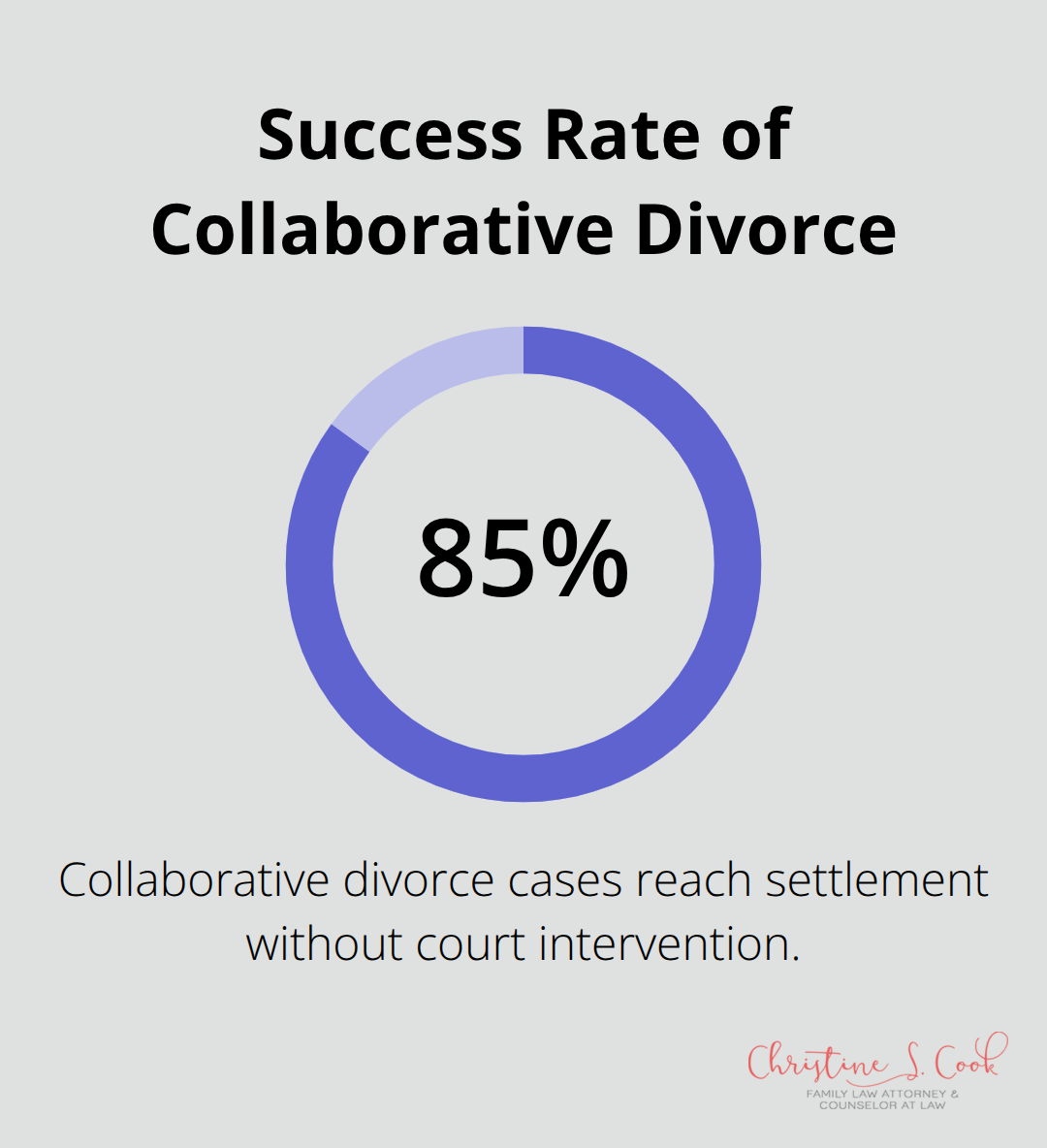Divorce communication often determines whether couples navigate separation peacefully or spiral into costly legal battles. Research shows that 67% of divorces involving poor communication result in prolonged court proceedings.
At Christine Sue Cook, LLC, we’ve seen how strategic dialogue transforms contentious splits into collaborative resolutions. The right communication approach protects both your finances and your family’s emotional well-being.
Poor communication during divorce proceedings creates a destructive cascade that affects every aspect of your separation. When couples resort to hostile exchanges, blame-filled messages, or complete silence, legal costs skyrocket as attorneys must handle increasingly complex negotiations. The average cost of a divorce is $15,000 per person and can increase to $100,000 for complex cases. Miscommunication leads to misunderstandings about asset division, child custody arrangements, and support obligations, which forces judges to make decisions that neither party finds satisfactory.

Every angry email or accusatory text message becomes evidence that opposing counsel can use against you in court. When communication fails, simple property divisions become contested battles that require expert valuations, depositions, and multiple court hearings. The Office for National Statistics reported that contested divorces in the UK take 14 months longer to resolve than uncontested cases. This extended timeline means higher attorney fees, court costs, and lost productivity as you spend months in legal proceedings instead of rebuilding your life.
Children absorb the communication patterns they witness during divorce proceedings. The manner in which parents handle everyday marital conflicts has a significant effect on how secure their children feel and significantly affects their future development. When parents communicate effectively, children feel secure that both parents remain committed to their well-being. Poor communication creates loyalty conflicts where children feel pressured to choose sides (leading to long-term emotional damage that affects their future relationships and mental health).
Communication patterns established during divorce often persist long after the final decree. Parents who develop hostile communication habits during separation typically struggle with co-parenting decisions for years afterward. This creates ongoing stress that affects school events, medical decisions, and holiday arrangements. The communication skills you practice during divorce proceedings become the foundation for all future interactions with your ex-spouse-making this period a critical opportunity to establish positive patterns that will benefit your entire family for decades to come.
Successful divorce communication requires clear boundaries about discussion topics and conversation timing. Set specific times for important discussions rather than allow divorce-related conversations to intrude on every interaction. Limit conversations to 30 minutes maximum, and agree that either party can request a break if emotions escalate. Create a written list of approved discussion topics such as child schedules, financial obligations, and property division, while you explicitly avoid blame, past grievances, or relationship analysis.
The High Conflict Institute developed the BIFF method to keep all written communication Brief, Informative, Friendly, and Firm. This approach reduces misunderstandings and prevents emotional escalation in divorce proceedings. Write concise messages that stick to facts and avoid lengthy explanations or justifications. Include only necessary information that moves the conversation forward. Maintain a respectful tone even when you feel frustrated (this protects your interests in potential court proceedings). State your position clearly without room for misinterpretation.

Transform accusatory statements into factual observations that focus on solutions rather than problems. Instead of “you never pick up the kids on time,” state “the pickup time is 3 PM” and ask for confirmation of availability. Replace emotional language like “you always” or “you never” with specific dates, times, and circumstances. Draft important messages and wait 24 hours before you send them, which allows you to review the tone and content when emotions have settled.
Schedule significant discussions when both parties are rested and have adequate time without interruptions. Avoid conversations immediately after work, late at night, or during stressful periods like holidays or family events. Meet in neutral locations such as coffee shops or mediation offices rather than former shared spaces that trigger emotional responses.
Professional mediators and collaborative attorneys can provide additional structure to these conversations when direct communication proves challenging.
Professional support becomes necessary when direct communication repeatedly breaks down or escalates into conflict. Collaborative divorce attorneys specialize in maintaining productive dialogue between separating spouses through structured negotiations that focus on shared goals rather than adversarial positions. These attorneys receive specific training in communication techniques and conflict resolution that traditional litigation lawyers typically lack. New Florida studies show that 85% of collaborative divorce cases reach settlement without court intervention, primarily due to improved communication protocols.

Collaborative attorneys create structured environments where both parties can address concerns without the threat of court battles. These professionals guide couples through interest-based negotiations that identify underlying needs rather than surface-level demands. The collaborative process requires both spouses to sign agreements that prevent either attorney from representing their client in court if negotiations fail (which motivates everyone to find workable solutions). This approach reduces the defensive posturing that typically characterizes traditional divorce proceedings and allows couples to focus on creative problem-solving.
Professional mediators provide neutral ground where both parties can express concerns without fear of immediate retaliation or legal consequences. Unlike judges who make binding decisions, mediators guide couples toward their own solutions through structured communication exercises. The American Bar Association found that mediated divorces cost 40% to 60% less than traditional litigation because improved communication reduces the need for extensive legal preparation and court time. Mediators teach specific techniques like reflective listening and reframing that help couples move past emotional triggers to address practical concerns.
Family therapists and communication coaches become essential when emotional trauma prevents effective dialogue between divorcing spouses. These professionals help individuals identify communication patterns that create conflict and develop healthier interaction styles. The American Association for Marriage and Family Therapy reports that couples who receive communication coaching during divorce show 73% improvement in co-parenting effectiveness post-separation. Communication coaches teach specific skills like emotion regulation and perspective-taking that prove invaluable during high-stress negotiations about child custody and financial arrangements.
The communication patterns you establish during divorce proceedings create effects that extend far beyond your final decree. Couples who master effective divorce communication during separation report 68% better co-parenting relationships five years post-divorce according to the Journal of Family Psychology. These skills become the foundation for future decisions about children’s education, medical care, and major life events without court intervention.
Your investment in better divorce communication pays dividends in reduced stress, lower legal costs, and healthier family dynamics. Children whose parents communicate respectfully during separation show better academic performance and fewer behavioral problems compared to those exposed to high-conflict interactions. The communication techniques you practice now will serve you in all future relationships and professional interactions (both personal and business).
Take one concrete step today to transform your approach. Schedule a structured conversation with your spouse or contact a professional who can guide your dialogue toward productive outcomes. At Christine Sue Cook, LLC, we help couples develop communication strategies that protect both their interests and their family’s well-being throughout the divorce process.
